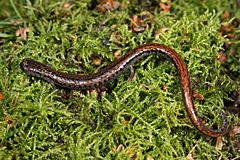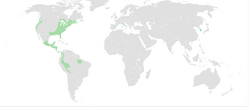Lungless salamanders facts for kids
Quick facts for kids Lungless salamanders |
|
|---|---|
 |
|
| Batrachoseps attenuatus, a plethodontid | |
| Scientific classification | |
| Kingdom: | |
| Phylum: | |
| Subphylum: | |
| Class: | |
| Order: | |
| Suborder: | |
| Family: |
Plethodontidae
|
| Subfamilies | |
|
Bolitoglossinae |
|
 |
|
| Native distribution of plethodontids (in green) | |
The Plethodontidae is a large group of salamanders. They are special because they do not have lungs. This is why they are called lungless salamanders. Instead of breathing with lungs, they breathe through their skin and the lining of their mouth and throat.
These amazing creatures live in many different places around the world. You can find them in British Columbia (Canada), Brazil, Sardinia (Italy), the Alps (Europe), and South Korea. They are the biggest group of salamanders, with many different kinds!
Discovering Lungless Salamanders
There are more than 350 types of lungless salamanders! Most of them live on land, which means they are terrestrial. They are often active during the daytime.
These salamanders can even communicate using their noses. They have special organs that help them smell chemicals in their environment. This helps them find food or other salamanders.
Meet the Slender Salamanders
One interesting type of lungless salamander is the Slender salamander. These are found along the Pacific Coast of North America. People sometimes call them "worm salamanders."
They get this name because their bodies are much thinner and skinnier than most other salamanders. If you ever gently touch a slender salamander, it might quickly bounce on the ground and then try to run away. This is their way of escaping danger!
Images for kids
-
Palaeoplethodon hispaniolae preserved in amber
See also
 In Spanish: Salamandras apulmonadas para niños
In Spanish: Salamandras apulmonadas para niños
 | Frances Mary Albrier |
 | Whitney Young |
 | Muhammad Ali |


